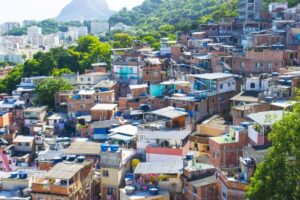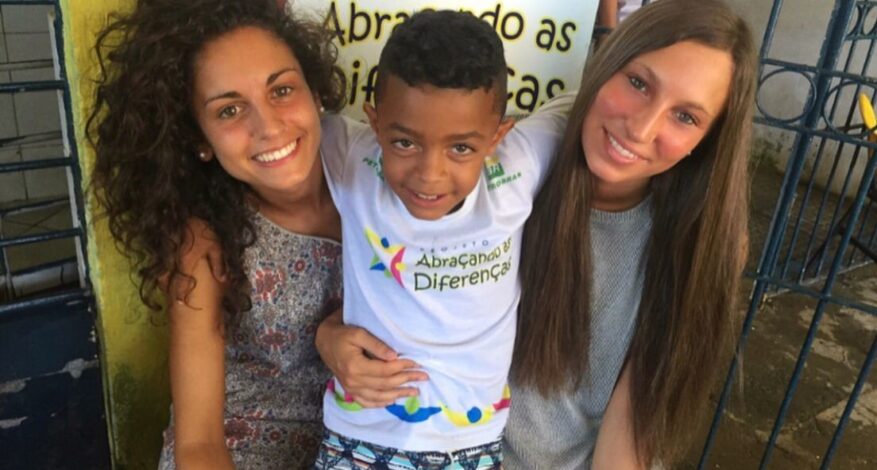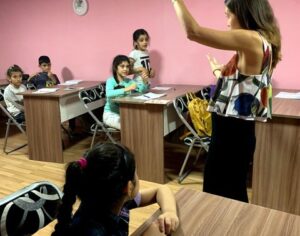TEACHING ITALIAN IN BRAZIL
Jessica’s experience
Jessica is a 26-year-old girl who has always been passionate about and fascinated by Brazil and its culture. That is why she studied the Portuguese language and literature at University in Venice. After she graduated, she spent three months (April-July 2017) volunteering in Brazil with Aiesec organisation. Aiesec is a non-profit, independent, non-party, non-political student association founded in 1948 and entirely managed by students. It promotes a network of international exchanges and aims to achieve peace and develop human potential, by boosting young people’s leadership skills thanks to experiences in stimulating contexts abroad. It has branches in 126 countries around the globe, which makes it the largest student association in the world, with a network of more than 100,000 students from more than 2400 universities. Jessica took part in two projects of one month and a half each, in two different schools. Both projects involve teaching Italian to children aged 7-14.
Two schools, two different points of view:
Two projects and two totally different types of school. The first project took place in São Josè dos Campos, close to São Paolo in the south of the country, which is considered the richest and most industrialized part of the country. In fact, that school was private, and its system was not much different from the one of the European schools in terms of organization and education.
 On the contrary, the second project was completely different. This other school was located in the north of Brazil, in Aguazinha to be precise, close to Recife, and here Jessica taught inside a small favela.
On the contrary, the second project was completely different. This other school was located in the north of Brazil, in Aguazinha to be precise, close to Recife, and here Jessica taught inside a small favela.
“The experience in the second school was much stronger because the conditions were precarious. The children, despite their situation, were very willing to learn and it was clear that they needed affection, which I gave them, and that they felt they received it from me. The only thing they wanted from me was to play football or dominoes, which is equivalent to having a telephone for them!”
Why is there so much crime in the favelas?
 In Portuguese, the term favela means the Brazilian slums, generally built on the outskirts of the major cities. The houses are built with different materials, from simple bricks to other waste material gathered from the garbage, and, very often, the roofs are in Eternit. The common problems of these neighbourhoods are degradation, widespread crime, and serious public hygiene issues due to the lack of suitable facilities for the disposal of sewage and for the provision of drinking water. Although the most famous favelas are located in the suburbs of Rio de Janeiro, there are some in all the major cities of the country.
In Portuguese, the term favela means the Brazilian slums, generally built on the outskirts of the major cities. The houses are built with different materials, from simple bricks to other waste material gathered from the garbage, and, very often, the roofs are in Eternit. The common problems of these neighbourhoods are degradation, widespread crime, and serious public hygiene issues due to the lack of suitable facilities for the disposal of sewage and for the provision of drinking water. Although the most famous favelas are located in the suburbs of Rio de Janeiro, there are some in all the major cities of the country.
And what about the children in the favelas?
Unconsciously, they are born and raised in a place where gunshots make them live in terror and bandits are likely to become their model. Currently, people involved in drug trafficking activities totally dominate the favelas and, consequently, capture the imagination of the little ones. Children live seeing these people selling drug packages, walking around with arms on their shoulders, deciding about the inhabitants’ lives and future, applying the most ferocious law, killing traitors, and responding to police invasions with weapons. It’s hard to imagine what it means to grow up in a place where there is nothing, from sewers to electricity. Where poverty is the everyday reality. Where clashes between criminals and police are the norm. Yet these are the conditions many of the children live in, in the favelas.
Jessica’s considerations
Brazil is characterized by very strong social disparities and faces problems such as extreme poverty, hunger, and illiteracy. In the rural areas of the country, millions of families are landless, and just as many have no rights to the land they have been cultivating and living on for generations. Besides these social injustices, there are many other difficulties they have to face such as drought and deforestation, which further threaten the food and economic security of the poorest. Hunger is an issue on the agenda for a large part of the population. Jessica says: “In general, I loved the experience, and I will definitely do it again. I came back with clearer ideas about many things. Brazil, favelas, people. I came back home with a spirit of carefree, which is something typical of Brazil, but also with a sense of infinite sadness. Brazil is a land that leaves you a lot in terms of enchanting places but, above all, in terms of wonderful people you meet. Everyone makes you feel at home! On the other hand, you are often in situations in which you don’t feel safe, you have to keep paying a lot of attention to avoid being robbed or entering the “wrong” areas. But Brazil is not just favelas.”


